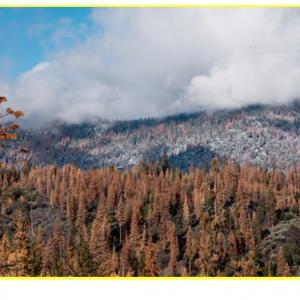Upcoming NC CASC webinar
Date
The Increasing Role of Drought in Ecological Transformation Thursday, February 9, 2023, 11 AM - 12 PM MT Presented by:
WYNNE MOSS USGS Northern Rocky Mountain Science Center
Register in advance for this meeting.
After registering, you will receive an email confirmation containing information about how to join the meeting.
Abstract:
Drought, despite being an episodic phenomenon, is capable of triggering persistent changes to ecosystems, with important consequences for both biodiversity and human communities. These transformational ecological droughts (TEDs) are increasing globally as a function of changing drought conditions, compounding stressors (including competing water use with humans), land management legacies, and novel climate contexts. Making decisions about how to adapt to these transformations is impaired by a limited recognition of the widespread potential for TEDs, a lack of understanding about the mechanisms by which transformation may occur, and uncertainty about the potential ecological trajectories such transformations will take. In this presentation, I will share the results of an interdisciplinary science synthesis that focused on how the risk of transformational drought is changing in the 21st century. I will provide a broad overview of the phenomenon of TED, including the diverse pathways by which it leads to transformation, highlighting mechanisms and case studies relevant to the North Central region.
About the speaker:
Wynne Moss is an ecologist and conservation biologist interested in how wild populations respond to environmental stressors, including land use transformation, climate change, and infectious disease. She is currently a biologist with the USGS Northern Rocky Mountain Science Center. Previously, Wynne worked as a postdoctoral scientist with Conservation Science Partners, an NC CASC consortium partner. Her postdoctoral research, funded by the National CASC, used collaborative science synthesis to better understand the potential for drought to trigger ecological transformation. She has a Ph.D. in Ecology and Evolutionary Biology from the University of Colorado. Wynne's dissertation work examined the interactions between amphibians and the concurrent threats of drought, infectious disease, and invasive species. She holds a M.S. in Wildlife Ecology from the University of Wisconsin-Madison, where her master’s research focused on the behavioral responses of mountain lions to increasing urbanization. You can read more about Wynne’s research at https://wynnemoss.weebly.com/.


